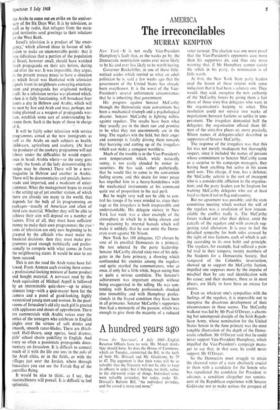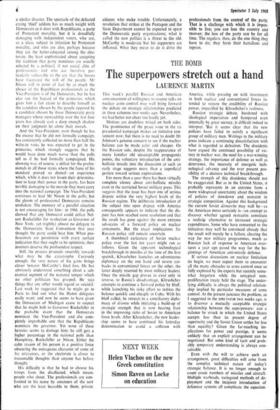The irreconcilables
AMERICA MURRAY KEMPTON
New York—It is not really Vice-President Humphrey's fault that, as the weeks go by, the Democratic nomination seems ever more likely to be his and ever less likely to be worth having.
Governor Rockefeller, in one of those little- noticed asides which remind us what an adult politician he is, said a few weeks ago that the government of the United States has already been overthrown. It is the worst of the Vice- President's several unfortunate circumstances that he is inheriting that government.
His progress against Senator McCarthy through the Democratic state conventions has been a mechanical triumph and a psychological disaster. Senator McCarthy is fighting militia against regulars. The results have been what they usually are in the short run and promise to be what they not uncommonly are in the long. The regulars win the field, but their anger and contempt is fatally driving them towards that harrying and cutting up of the irregulars which can make a conquest worthless.
Much of the trouble is in the Vice-President's own temperament which, while naturally sunny, is too easily clouded by minor in- securities. He has said, rather pathetically, that he would like to come to the convention feeling serene, and this desire for inner peace has impelled him to a heavy-handedness with the mechanical instruments at his command quite out of proportion to his real peril.
But he might very well not be able to con- trol his troops if he were minded to, since their rage at the irregulars is both irrepressible and understandable. His delegate victory in New York last week was a clear example of the atmosphere in which he is being chosen and the poisoning by internal hatreds which will make it unlikely that he can unite the Demo- crats even against Mr Nixon.
New York has 188 delegates, 123 chosen by vote of its enrolled Democrats in a primary, the rest selected by the party leadership. Senator McCarthy elected sixty-two of his dele- gates in the June primary, a showing which confounded his enemies among the regulars and quite startled the commentators, who at once, if only for a little while, began seeing him as quite a serious candidate. The Senator's achievement was important enough without being exaggerated in the telling. He was con- tending with Kennedy professionals shocked into immobility and with Humphrey profes- sionals in the frayed condition they have been in all primaries. Senator McCarthy's supporters thus had a monopoly of the passion, which was enough to give them the majority of a reduced voter turnout. The election was one more proof that the Vice-President's opponents care more than his supporters do, and thus one more warning that, if Mr Humphrey cannot satisfy the rebels in his party, its nomination is of little worth.
At first, the New York State party leaders read the lesson of these returns with some indication that it had been a salutary one. They would, they said, recognise the new authority of the McCarthy forces by giving them a fair share of those sixty-five delegates who were in the organisation's keeping to select. This resolution could not survive two weeks of negotiations between factions so unlike in tem- perament. The irregulars demanded half the delegates; the organisation offered them fif- teen of the sixty-five places or, more precisely, fifteen names of delegates-select described as supporters of Senator McCarthy.
The response of the irregulars was that this list was not merely inadequate but thoroughly suspect, since it included the names of persons whose commitment to Senator McCarthy came as a surprise to his campaign managers, they having been anything but active in his cause until now. This charge, if true, has a defence; the McCarthy activist is the sort of insurgent who is a considerable affliction to the organisa- tion; and the party leaders can be forgiven for wanting McCarthy delegates who are at least loyal to them if not to flag and country.
But no agreement was possible; and the state committee meeting which worked the will of the regulars was a revelation of how irrecon- cilable the conflict really is. The McCarthy forces walked out after their defeat, amid the catcalls of the regulars and with avowals sug- gesting total alienation. It is easy to feel the detached sympathy for both sides aroused by the sight of two factions, each of which is act- ing according to its own habit and principle. The regulars, for example, had suffered a pain- ful trial to their tempers; twenty members of the Students for a Democratic Society, that vanguard of the Columbia insurrection, showed up to support the McCarthy faction, impelled one supposes more by the impulse of mischief than by any real identification with his cause; and their manners, there as in most places, are likely to have been an excuse for excess.
Even so, whatever one's sympathies with the feelings of the regulars, it is impossible not to recognise the disastrous development of their circumstances in these scenes. The McCarthy walkout was led by Mr Paul O'Dwyer, a charm- ing but untempered disciple of the Irish Repub- lican Army, whose nomination for the United States Senate in the June primary was the most tangible illustration of the depth of the Demo- cratic rebellion. Mr O'Dwyer said that he could never support Vice-President Humphrey, which impelled the Vice-President's campaign mana- ger to say that, in that case, he could never support Mr O'Dwyer.
So the Democrats must struggle to retain the electoral votes of a state absolutely crucial to them with a candidate for the Senate who has repudiated the candidate for President in advance, a condition altogether too reminis- cent of the Republican experience with Senator Goldwater not to make serious the prospect of a similar disaster. The spectacle of the defeated crying 'thief' seldom has as much weight with Democrats as it does with Republicans, a party of Protestant morality, but it is dreadfully damaging with independent voters, who are, as a class, subject to infection by Protestant morality, and who are also, perhaps because they are the better-educated among the elec- torate, the least sophisticated about accepting the tradition that party nominees are usually selected by a political, if not social, elite of professionals--and who are therefore par- ticularly vulnerable to the cry that the bosses have frustrated the will of the people. Mr Nixon will in point of fact be as much the choice of the Republican professionals as the Vice-President is of the Democrats, but he has also run the hazard of the primaries, which gives him a fair claim to describe himself as the candidate chosen by the people opposed by a candidate chosen by those Democratic party managers whose stewardship over the last four years has already cast a deep enough shadow on their judgment let alone their morals.
And the Vice-President, even though he has the excuse that he did not formally campaign, has consistently collected no more than half the write-in votes he was expected to get in the primaries, which strongly suggests that he would have done much worse than the polls tell us if he had formally campaigned. His showing was, of course, a defeat for the profes- sionals in all those states where the fame of his standard proved so dismal—an experience which, while it does not lessen their determina- tion to keep their power in the party, has been terribly damaging to the morale they must carry into the national campaign. The Vice-President continues to lead Mr Nixon in the polls; but the gloom of professional Democrats remains unshaken. The memory of a parallel situation is not encouraging for him: in 1966, the polls showed that any Democrat could defeat Nel- son Rockefeller for re-election as Governor of New York; yet (rightly) almost no delegate to the Democratic State Convention that year thought the party could beat him. When pro- fessionals are pessimistic with every surface indication that they ought to be optimistic, their instincts deserve the profoundest respect.
Still, the process proceeds smoothly towards what may be the catastrophe. Curiously enough, the very nature of his gains brings closer Senator McCarthy's final loss. He has obviously understood something about a sub- stantial segment of the national temper which no other politician has grasped. He says things that any other would regard as suicidal. Last week he suggested that he might go to Paris to find out what the Hanoi delegates really want; and now he seems to have given the Democrats of Michigan cause to suspect that he might bolt to Governor Rockefeller in the probable event that the Democrats nominate the- Vice-President and ,the com- pletely improbable one that the Republicans nominate the governor. Yet none of these heresies seems to damage him; he still gets a higher percentage in the national polls than Humphrey, Rockefeller or Nixon. Either the calm reason of his person is a positive force obscuring the outrageous character of some of his utterances, or the electorate is closer to treasonable thoughts than anyone has before thought.
His difficulty is that he had to choose his troops from the disaffected, which means people who shout. The professionals are con- fronted in his name by amateurs of the sort who are the least bearable to them, private
citizens who make trouble. Unfortunately, a revolution that strikes at the Pentagon and the State Department cannot be expected to spare the Democratic party organisations; what is called the new politics is a threat to the old. McCarthy is moderate but his supporters are inflamed. What they mean to do is drive the professionals from the control of the party. That is a challenge with which it is impos- sible to live; you can lose the country and recover; the loss of the party can be for all time. The regulars, then, do the one thing they have to do; they form their battalions and repress.











































 Previous page
Previous page